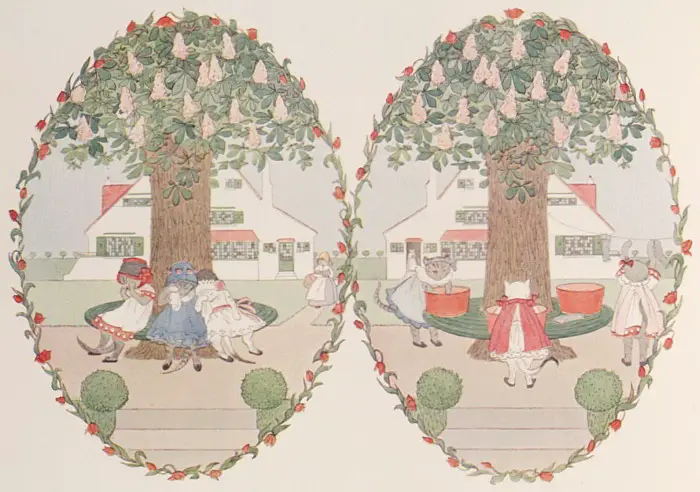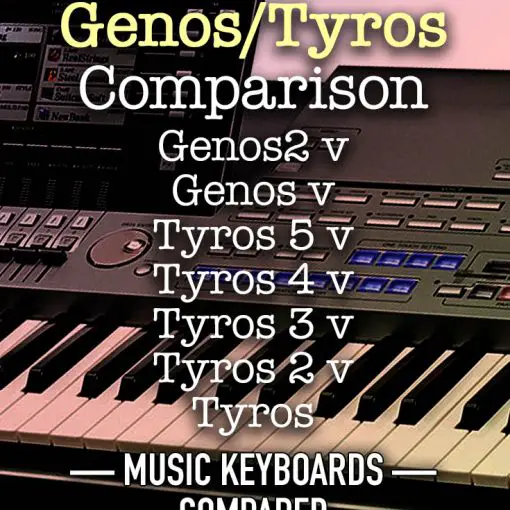Edit: Updated October 2023 to incorporate new models.
Yamaha introduced the first two models in its more compact and portable P Series of digital pianos in 1994, and now nearly thirty years on there have been twenty-four models in the entire line, with eight currently on sale and sixteen discontinued.
Portable may be a relative term in comparison to some of Yamaha’s other keyboard instruments, but for a well-functioned and high quality digital piano, it’s fair to say the models in the P Series are easier to move around, even for a solo musician, which is good news for gigging and session players.
The main selling points of the P Series has always been producing a fairly lightweight instrument with emphasis on the quality of the keyboard feel and piano sound. Additional features tend to be aimed at the pianist, including pedal support, metronome, and decent speakers, along with a smattering of extras such as a handful of other real world acoustic/electronic instruments, keyboard voice split/layering, audio and MIDI and basic recording functions.
Although there are fewer functions than might be found on Yamaha’s portable home keyboards, the P Series not only stand as good mid-level digital pianos but can also be used as basic keyboard controllers for use with MIDI, where other keyboards, modules and computer DAWs (digital audio workstations) can be connected.
All but one of the P Series instruments has a full 88-key range, the current P-121 has 73 keys making it more compact, but otherwise functionally identical to the P-125.
There are no additional performance/manipulation controls such as aftertouch, pitch bend or modulation on the keys or the keyboard.
Current Models

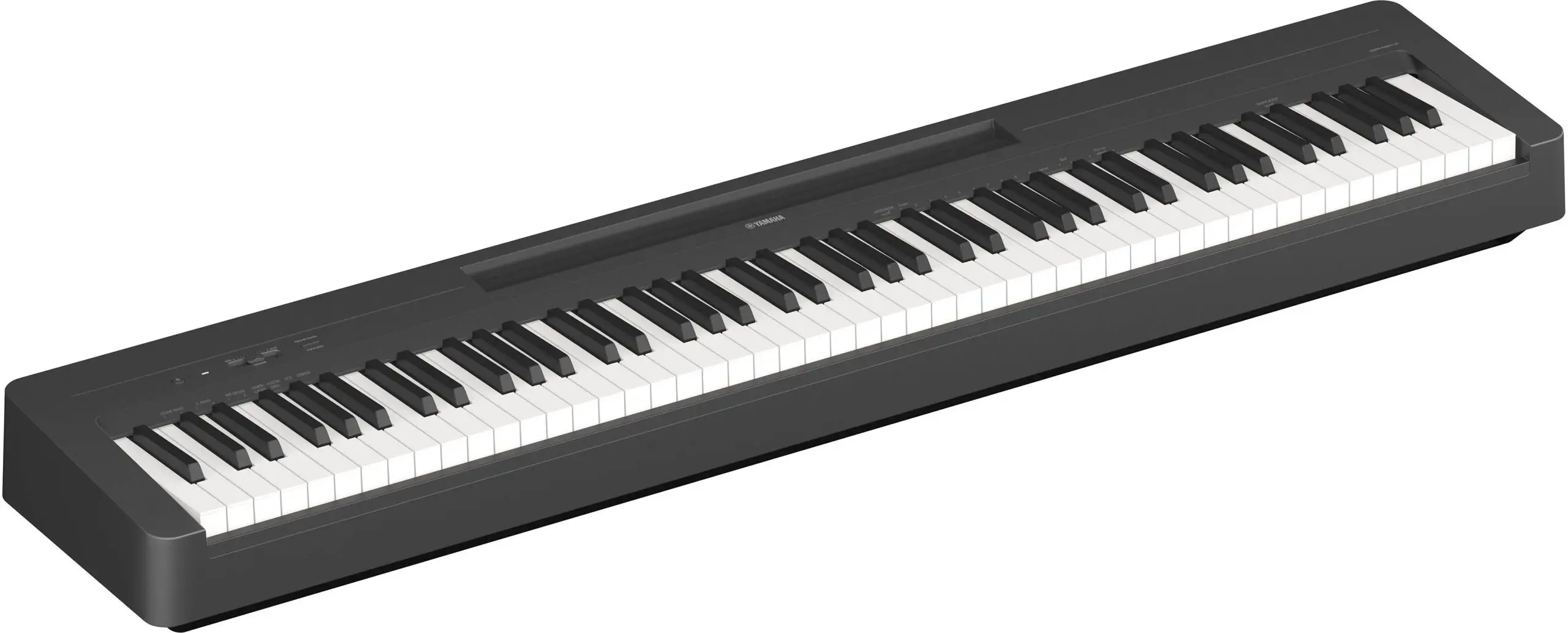
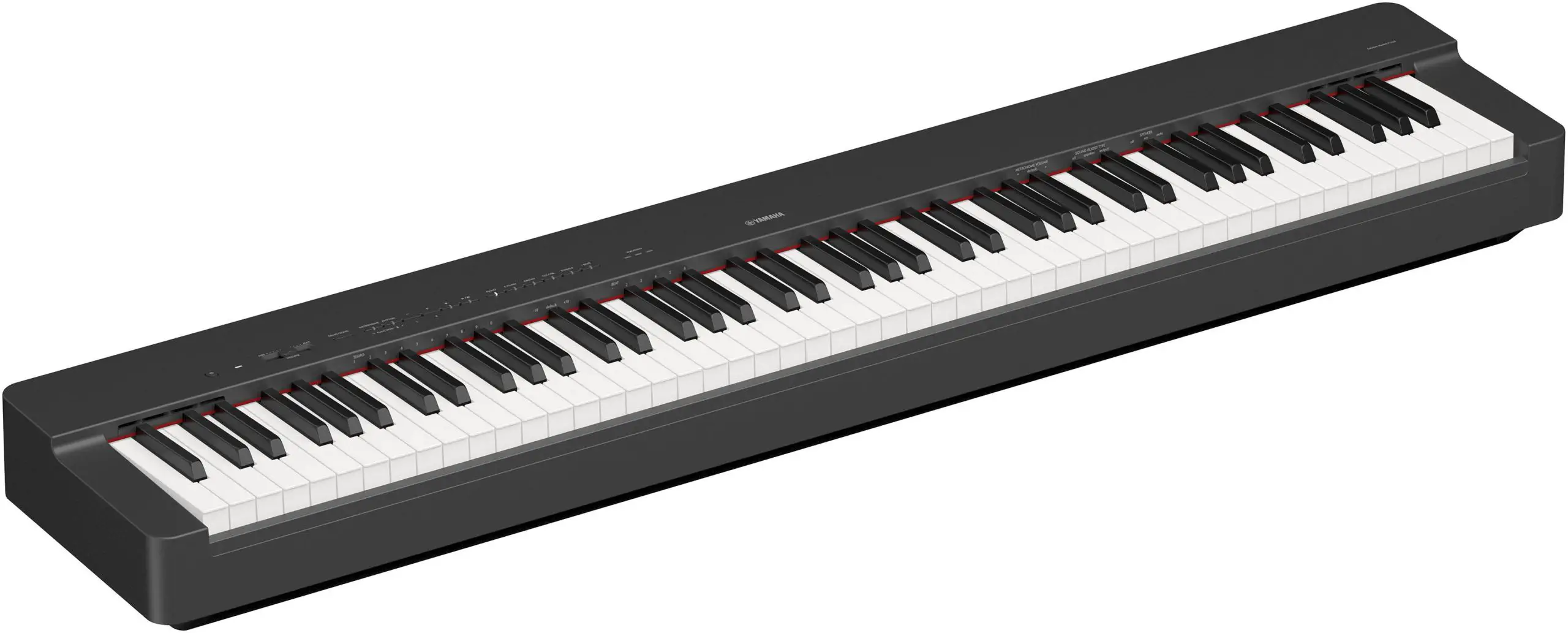
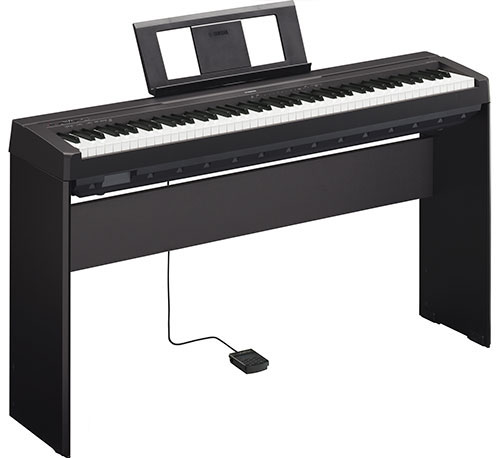
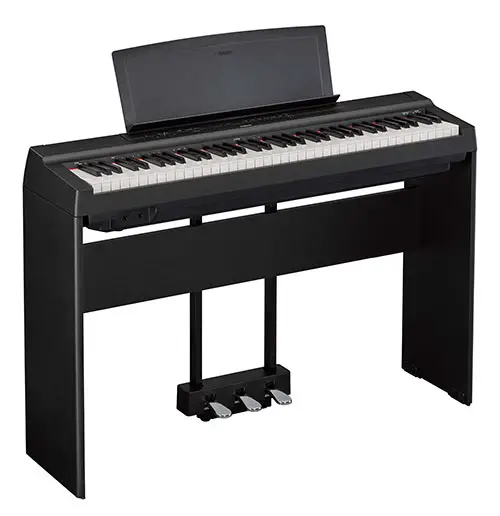
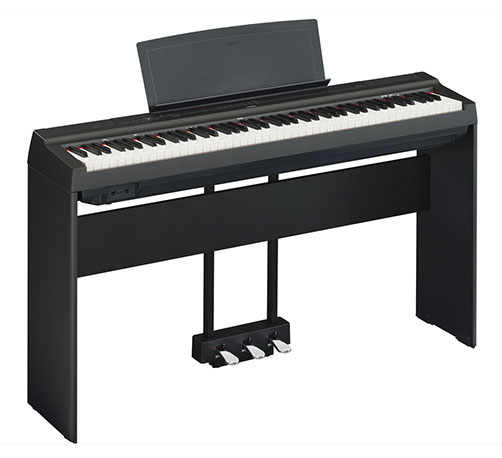
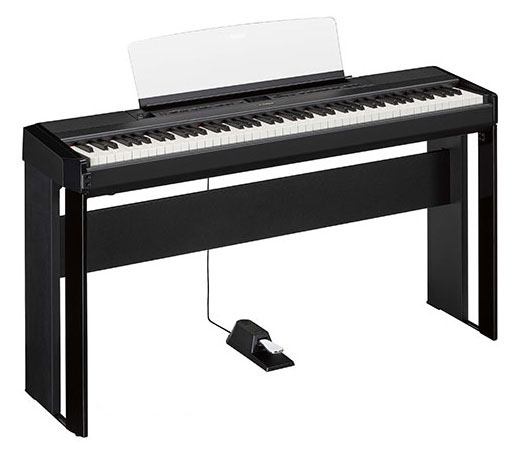
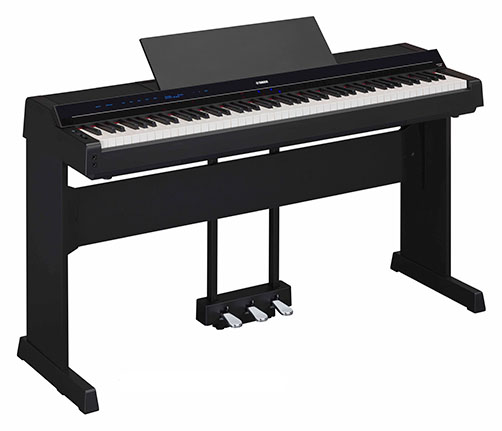
As of 2023, the eight current models are the top-of-line P-525, the P-515, the P-225 (which will soon supersede the P-125a), P-121, P-145 (which will soon supersede the P-45), and P-S500. Yamaha updated the P-125 slightly to the P-125a, with the only apparent difference being the ‘a’ model includes key-off samples.
View the latest Yamaha P Series digital pianos on Amazon.
Keyboard
The P-525 has a GrandTouch-S keyboard which is also found on recent high-end Clavinova keyboards. Yamaha claims this is about as close in realism to an acoustic grand piano as possible. These solid wooden keys are laminated to make them warp resistant and highly durable.
The P-515 features the NWX (Natural Wood X) keyboard, which means the white keys have wooden keys and all keys are constructed with synthetic ebony and ivory key tops, plus escapement.
The P-125a, P-121 and P-S500 all feature the Graded Hammer standard keyboard, with a matte finish on the black keys, while the P-45 has a standard Graded Hammer standard keyboard. The P-225 and P-145 feature a GHC keyboard with matte black keytops.
All have 88 keys except the P-121, with 73.
Sound Generation
The P-525 and P-515 both use Yamaha CFX, Bösendorfer Imperial, CFX Binaural Sampling, so is arguably the most realistic of all the P Series instruments to date.
The P-S500 uses Yamaha CFX & Bösendorfer Imperial piano samples.
The P-125a and P-121 use the Pure CF sound engine, while the P-45 employs Yamaha’s well-established AWM Stereo Sampling system.
The P-225 features Yamaha CFX sampling with a “lite” version of Virtual Resonance Modelling, while the P-145 samples the Yamaha CFIIIS and has no additional processing capabilities.
Polyphony
The P-525, P-515 and P-S500 have a hefty 256 note polyphony, for almost limitless playing possibilities even when dual voices are used. The P-125a, P-121 and P-225 have 192 polyphony while the P-45 and P-145 have adequate, but now rather outdated, 64 notes which will cause noticeable dropouts when playing more advanced/sustained pieces of music.
Voices
The P-525 and P-515 adds a lot of nuanced features to its piano voices, including key-off samples, virtual resonance modelling and binaural sampling. The other models do not have these features.
The P-525 has a total of 44 standard voices, 18 drum kits and 480 XG voices. The P-515 has a total of 40 standard voices, as well as 18 drum kits and 480 XG voices for compatibility with MIDI standards. This makes it a little more versatile for musicians who want a wider selection of voices. The P-225, P-125 and P-121 have 24 voices while the P-45 and P-145 have ten.
The P-S500 has 660 voices including 13 VRM Voices, 111 Super Articulation Voices, 25 Natural! Voices, 27 Sweet! Voices, 47 Cool! Voices, 58 Live! Voices, 29 Organ Flutes! Voices.
Recording
All current P Series pianos except the P-45 and P-145 have the ability to record songs in some format or another. The P-525 and P-515 have a wide range of features including direct audio recording and MIDI storage, while the P-125a and P-121 don’t allow audio recording. The P-S500 can also do time stretching, pitch shifting and vocal cancellation in its audio recording.
Connectivity
All models have a good range of pedal, audio, MIDI and USB connection options. All models can support a sustain pedal with half-pedalling capability, and all but the P-45 can accommodate one of Yamaha’s pedal units. The P-525 and P-515 offer Bluetooth connections.
Price
You’ll pay a premium for the top-of-line P-515, coming in at a RRP of $1,999. The P-125 is $999, the P-121 is $899, while the entry-level P-45 is $599. The P-S500 is listed at $2,499 although Yamaha has shown a reduced price of $1,999. The price of the P-525, P-225 and P-145 are to be confirmed.
Full Specifications
Here is the full specification table as provided by Yamaha.
|
|
|
P-225 |
P-145 |
P-525 |
P-515 |
P-125 |
P-121 |
P-45 |
|
Size/Weight |
||||||||
|
Dimensions |
Width |
1,326 mm [52-3/16″] |
1,326 mm [52-3/16″] |
1336mm (52-5/8″ ) |
1336mm (52-5/8″ ) |
1326mm (52.20″) |
1114mm (43.86″) |
1,326mm (52-1/4”) |
|
Height |
129 mm [5-1/16″] (with music rest: 327 mm [12-7/8″]) |
129 mm [5-1/16″] (with music rest: 327 mm [12-7/8″]) |
376mm (5-11/16″) |
376mm (5-11/16″) |
166mm (6.54″) |
166mm (6.54″) |
154mm (6.0”) |
|
|
Depth |
272 mm [10-11/16″] (with music rest: 362 mm [14-1/4″]) |
268 mm [10-9/16″] (with music rest: 320 mm [12-5/8″]) |
145mm (14-13/16″) |
145mm (14-13/16″) |
295mm (11.61″) |
295mm (11.61″) |
295mm (11-1/2”) |
|
|
Weight |
Weight |
11.5 kg [25 lb, 6 oz] |
11.1 kg [24 lb, 8 oz] |
22.0kg (48 lb, 8 oz) |
22.0kg (48 lb, 8 oz) |
11.8kg (26.01 lbs) |
10.0kg (22.05 lbs) |
11.5kg (25lbs., 4oz) |
|
Control Interface |
||||||||
|
Keyboard |
Number of Keys |
88 |
88 |
88 |
88 |
88 |
73 |
88 |
|
Type |
GHC keyboard with matte black keytops |
GHC keyboard with matte black keytops |
GrandTouch-S™ Keyboard: wooden keys (white only), synthetic ebony and ivory key tops, escapement |
NWX (Natural Wood X) keyboard: wooden keys (white only), synthetic ebony and ivory keytops, escapement |
Graded hammer standard (GHS) keyboard, matte finish on black keys |
Graded hammer standard (GHS) keyboard, matte finish on black keys |
Graded hammer standard (GHS) keyboard |
|
|
Touch Sensitivity |
Hard/medium/soft/fixed |
Hard/medium/soft/fixed |
Hard2/Hard1/Medium/Soft1/Soft2/Fixed |
Hard2/Hard1/Medium/Soft1/Soft2/Fixed |
Hard/medium/soft/fixed |
Hard/medium/soft/fixed |
Hard/medium/soft/fixed |
|
|
Display |
Type |
N/A |
N/A |
Full Dots LCD |
Full Dots LCD |
N/A |
N/A |
N/A |
|
Size |
N/A |
N/A |
198 x 100 dots |
128 x 64 dots |
N/A |
N/A |
N/A |
|
|
Panel |
Language |
English |
English |
English, Japanese |
English |
English |
English |
English |
|
Voices |
||||||||
|
Tone Generation |
Piano Sound |
Yamaha CFX |
Yamaha CFIIIS |
Yamaha CFX, Bösendorfer Imperial |
Yamaha CFX, Bösendorfer Imperial, CFX Binaural Sampling |
Pure CF Sound Engine |
Pure CF Sound Engine |
AWM Stereo Sampling |
|
Binaural Sampling |
– |
– |
Yes (CFX Grand Voice only) |
Yes (CFX Grand Voice only) |
N/A |
N/A |
N/A |
|
|
Key-off Samples |
– |
– |
No |
Yes |
– |
– |
– |
|
|
Smooth Release |
– |
– |
No |
Yes |
– |
– |
– |
|
|
Virtual Resonance Modeling (VRM) |
Yes (VRM Lite) |
– |
Yes |
Yes |
– |
– |
– |
|
|
Polyphony |
Number of Polyphony (Max.) |
192 |
64 |
256 |
256 |
192 |
192 |
64 |
|
Preset |
Number of Voices |
24 |
10 |
44 Voices + 18 Drum/SFX Kits + 480 XG Voices |
40 Voices + 18 Drum/SFX Kits + 480 XG Voices |
24 |
24 |
10 |
|
Effects |
||||||||
|
Types |
Reverb |
4 |
4 |
7 |
6 |
4 |
4 |
4 |
|
Chorus |
– |
– |
3 |
3 |
– |
– |
– |
|
|
Intelligent Acoustic Control (IAC) |
Yes |
– |
Yes |
Yes |
Yes |
Yes |
– |
|
|
Stereophonic Optimizer |
Yes |
– |
Yes |
Yes |
– |
– |
– |
|
|
Functions |
Dual/Layers |
Yes |
Yes |
Yes |
Yes |
Yes |
Yes |
Yes |
|
Split |
Yes |
– |
Yes |
Yes |
Yes |
Yes |
Yes |
|
|
Duo |
Yes |
Yes |
Yes |
Yes |
Yes |
Yes |
Yes |
|
|
Functions |
||||||||
|
Overall Controls |
Metronome |
Yes |
Yes |
Yes |
Yes |
Yes |
Yes |
Yes |
|
Tempo Range |
5 – 280 |
32 – 280 |
5 – 500 |
5 – 500 |
5-280 |
5-280 |
32-280 |
|
|
Transpose |
-6 – 0 – +6 |
-6 – 0 – +6 |
-12 – 0 – +12 |
-12 – 0 – +12 |
-6 – 0 – +6 |
-6 – 0 – +6 |
-6 – 0 – +6 |
|
|
Tuning |
414.8 – 440.0 – 466.8 Hz (approx. 0.2 Hz increments) |
414.8 – 440.0 – 466.8 Hz (approx. 0.2 Hz increments) |
414.8 – 440.0 – 466.8 Hz (approx. 0.2 Hz increments) |
414.8 – 440.0 – 466.8 Hz (approx. 0.2 Hz increments) |
414.8 – 440.0 – 446.8 Hz |
414.8 – 440.0 – 446.8 Hz |
414.8 – 440.0 – 446.8 Hz |
|
|
Rhythm |
20 |
– |
40 |
40 |
20 |
20 |
– |
|
|
Storage and Connectivity |
||||||||
|
Storage |
Internal Memory |
– |
– |
Total maximum size approx. 1.4 MB |
Total maximum size approx. 1.4 MB |
– |
– |
– |
|
External Drives |
– |
– |
USB Flash Memory (optional) |
USB Flash Memory (optional) |
– |
– |
– |
|
|
Connectivity |
DC IN |
Yes |
Yes |
16V |
16V |
12V |
12V |
12V |
|
Headphones |
Yes |
Yes |
Standard stereo phone jack (x 2) |
Standard stereo phone jack (x 2) |
Standard x2 |
Standard x2 |
Standard |
|
|
Sustain Pedal |
Yes |
Yes |
Yes |
Yes |
Yes (Half pedal available with optional FC3A) |
Yes (Half pedal available with optional FC3A) |
Yes (Half pedal available with optional FC3A) |
|
|
Pedal Unit |
Yes |
Yes |
Yes |
Yes |
Yes (Optional) |
Yes (Optional) |
No |
|
|
MIDI |
Yes |
Yes |
Yes |
In/Out |
– |
USB |
No |
|
|
AUX IN |
– |
– |
Stereo mini jack |
Stereo mini jack |
– |
– |
– |
|
|
AUX OUT |
Yes |
– |
[L/L+R][R] |
[L/L+R][R] |
[L/L+R][R] |
[L/L+R][R] |
No |
|
|
USB TO DEVICE |
– |
– |
Yes |
Yes |
– |
– |
– |
|
|
USB TO HOST |
Yes |
Yes |
Yes |
Yes |
Yes |
Yes |
Yes |
|
|
Bluetooth |
Audio |
– |
– |
Yes |
Yes |
– |
– |
– |
|
Amplifiers and Speakers |
||||||||
|
Amplifiers |
7W x 2 |
7W x 2 |
(20 W + 6 W) x 2 |
(15 W + 5 W) x 2 |
7W x 2 |
7W x 2 |
6W x 2 |
|
|
Speakers |
(Oval (12 cm x 8 cm) + 5 cm) x 2 |
Oval (12 cm x 8 cm) x 2 |
(Oval (12 cm x 6 cm) + 2.5 cm (dome)) x 2 |
(Oval (12 cm x 6 cm) + 2.5 cm (dome)) x 2 |
12 cm x 2 + 4 cm x 2 |
12 cm x 2 + 4 cm x 2 |
12 cm (4-1/2”) x 2 |
|
|
Power Supply |
|
|
|
|||||
|
Power Supply |
PA-150B or an equivalent recommended by Yamaha (Output: DC 12 V, 1.5 A) |
PA-150B or an equivalent recommended by Yamaha (Output: DC 12 V, 1.5 A) |
PA-300C or an equivalent recommended by Yamaha |
PA-300C or an equivalent recommended by Yamaha |
PA-150 or other Yamaha-preferred parts |
PA-150 or other Yamaha-preferred parts |
PA-150 or other Yamaha-preferred parts |
|
|
Power Consumption |
9W |
6W |
18 W |
15 W |
9 W |
9 W |
6 W |
|
|
Auto Power Off Function |
– |
– |
Yes |
Yes |
Yes |
Yes |
Yes |
|
|
Accessories |
|
|
|
|||||
|
Included Accessories |
Music Rest |
Yes |
Yes |
Yes |
Yes |
Yes |
Yes |
Yes |
|
Pedal/Footswitch |
Yes |
Yes |
Yes |
FC4A |
Yes |
Yes |
Yes |
|
|
Songs (Audio) |
||||||||
|
Recording Time |
– |
– |
80 minutes/Song |
80 minutes/Song |
– |
– |
– |
|
|
Compatible Data Format |
Recording |
– |
– |
WAV (44.1 kHz, 16 bit, Stereo) |
WAV (44.1 kHz, 16 bit, Stereo) |
– |
– |
– |
|
Playback |
– |
– |
WAV (44.1 kHz, 16 bit, Stereo) |
WAV (44.1 kHz, 16 bit, Stereo) |
– |
– |
– |
|
|
Songs (MIDI) |
|
|
|
|||||
|
Preset |
Number of Preset Songs |
21 |
10 |
21 Voice Demo Songs + 50 Classics |
21 Voice Demo Songs + 50 Classics |
21 Voice Demo Songs + 50 Classics |
21 Voice Demo Songs + 50 Classics |
– |
|
Recording |
Number of Songs |
1 |
– |
250 |
250 |
1 |
1 |
– |
|
Data Capacity |
100KB |
– |
Approx. 500 KB/Song |
Approx. 500 KB/Song |
100 KB per song (approx. 11,000 notes) |
100 KB per song (approx. 11,000 notes) |
– |
|
|
Format |
Playback |
– |
– |
SMF (Format 0, Format 1) |
SMF (Format 0, Format 1) |
SMF (Format 0, Format 1) |
SMF (Format 0, Format 1) |
– |
|
Recording |
– |
– |
SMF (Format 0) |
SMF (Format 0) |
SMF (Format 0) |
SMF (Format 0) |
– |
|
|
RRP |
|
TBC |
TBC |
TBC |
$1999 |
$999 |
$899 |
$599 |
Discontinued Models
There are sixteen models Yamaha has discontinued, dating back to 1994. Clearly, technology has advanced, and prices generally reduced, since then, so we would not generally recommend picking up one of these older instruments unless they are in very good working condition and can be bought for a small price.
The earliest lower-end models only had 32 notes of polyphony, which is generally considered far too low for all but the simplest piano music to be played without glitches and drop-outs. Later and higher-end models had 64,, 128 or even 256 notes of polyphony, putting them more on a par with the current lineup of P Series digital pianos.
Sound technology has advanced, and although Yamaha’s AWM sampling system is good, it will not rival the more advanced systems found on the latest models. That said, you pay a premium for the newer, advanced instruments.
Take a look at the specifications, based on the information given in the official Yamaha manuals for each instrument. The mid- to late 2010 models are definitely still worth considering if they can be found in good condition.
We have not included the pricing information as it would generally be unhelpful, given inflation and the fact these can no longer be bought new.
|
|
P-300 |
P-500 |
P-200 |
P-120 |
P-60 |
P-70 |
P-140 |
P-65 |
P-85 |
P-155 |
P-95 |
P-35 |
P-105 |
P-255 |
P-115 |
P-515 |
|
Keys |
88 |
88 |
88 |
88 |
88 |
88 |
88 |
88 |
88 |
88 |
88 |
88 |
88 |
88 |
88 |
88 |
|
Type |
? |
includes aftertouch |
GH Keyboard |
? |
? |
? |
GH Keyboard |
? |
? |
GH Keyboard |
Graded Hammer Standard (GHS) Keyboard |
GH Keyboard |
Graded Hammer Standard (GHS) |
Graded Hammer (GH) Keyboard with Synthetic Ivory Keytops |
GHS (Graded Hammer Standard) keyboard with matte black keytops |
NWX (Natural Wood X) keyboard: wooden keys (white only), synthetic ebony and ivory keytops, escapement |
|
Polyphony |
32 |
32 |
64 |
64 |
32 |
32 |
64 |
32 |
64 |
128 |
64 |
32 |
128 |
256 |
192 |
256 |
|
Sound Generation |
AWM Dynamic Stereo Sampling |
AWM Dynamic Stereo Sampling |
AWM Dynamic Stereo Sampling |
AWM Dynamic Stereo Sampling |
AWM Dynamic Stereo Sampling |
AWM Dynamic Stereo Sampling |
AWM Dynamic Stereo Sampling |
AWM Dynamic Stereo Sampling |
AWM Dynamic Stereo Sampling |
AWM Dynamic Stereo Sampling |
AWM Dynamic Stereo Sampling |
AWM Dynamic Stereo Sampling |
? |
Pure CF Sound Engine |
Pure CF Sound Engine |
Yamaha CFX, Bösendorfer Imperial |
|
Sensitivity |
Velocity Curve |
Velocity Curve |
Hard/Medum/Soft/Fixed |
Hard/Medum/Soft/Fixed |
– |
Hard/Medum/Soft/Fixed |
Hard/Medum/Soft/Fixed |
Hard/Medum/Soft/Fixed |
Hard/Medum/Soft/Fixed |
Hard/Medum/Soft/Fixed |
Hard/Medum/Soft/Fixed |
Hard/Medum/Soft/Fixed |
Hard/Medum/Soft/Fixed |
Hard/Medum/Soft/Fixed |
Hard/Medum/Soft/Fixed |
Hard2/Hard1/Medium/Soft1/Soft2/Fixed |
|
Voices |
11 |
11 |
13 |
14 |
10 |
10 |
14 |
8 |
10 |
17 |
10 |
10 |
14 |
24 |
14 |
40 Voices + 18 Drum/SFX Kits + 480 XG Voices |
|
Accompaniment |
– |
– |
– |
– |
– |
– |
– |
– |
– |
– |
– |
– |
– |
10 |
– |
40 |
|
Recording |
– |
– |
Y |
Y |
– |
– |
Y |
– |
Y |
Y |
Y |
– |
Y |
Y |
Y |
Y |
|
Audio |
In/Out |
Out |
In/Out |
Out |
Out |
Out |
Out |
Out |
Out |
Out |
Out |
Out |
Out |
In/Out |
Out |
In/Out |
|
USB |
– |
– |
– |
Host |
– |
– |
Host |
– |
– |
Device |
– |
– |
Host |
Host/Device |
Host |
Host/Device |
|
MIDI |
In/Out/Thru |
In/Out/Thru |
In/Out/Thru |
In/Out |
In/Out |
In/Out |
In/Out |
In/Out |
In/Out |
In/Out |
In/Out |
In/Out |
– |
In/Out |
– |
In/Out |
|
Pedals |
Sustain, Foot Controller x 3 |
Sustain, Foot Controller x 3 |
Foot Controller, Sustain, Sostenuto, Soft |
Sustain/Aux |
Sustain |
Sustain |
Sustain/Aux |
Sustain |
Sustain/Unit |
Sustain/Aux |
Sustain/Unit |
Sustain |
Sustain/Unit |
Sustain/Unit |
Sustain/Unit |
Aux/Unit |
|
Amplifier |
20W x 2 |
? |
30W x 2 |
12.5W x 2 |
8W x 2 |
6W x 2 |
6W x 2 |
6W x 2 |
6W x 2 |
12W x 2 |
6W x 2 |
6W x 2 |
7W + 7W |
15W x 2 |
7W + 7W |
(15 W + 5 W) x 2 |
|
Speakers |
13 cm (5-1/8”) x 2 |
? |
13 cm (5-1/8”) x 2 |
Oval (12 cm x 6 cm) x 2 |
Oval (12cm × 6cm) × 2 |
(12 cm × 6 cm) × 2 |
(12 cm × 6 cm) × 2 |
(12 cm × 6 cm) × 2 |
(12 cm × 6 cm) × 2 |
(12 cm × 6 cm) × 2 |
(12 cm × 6 cm) × 2 |
12cm x 2 |
12 cm x 2 + 5 cm x 2 |
(10cm + 2.5cm) × 2 |
12 cm x 2 + 4 cm x 2 |
(Oval (12 cm x 6 cm) + 2.5 cm (dome)) x 2 |
|
Power |
? |
25W |
? |
28W |
? |
? |
? |
? |
20W |
? |
? |
? |
7W |
15W |
6W |
16V |
|
Year |
1994 |
1994 |
1998 |
2001 |
2002 |
2005 |
2005 |
2006 |
2007 |
2008 |
2009 |
2012 |
2012 |
2013 |
2014 |
2018 |
